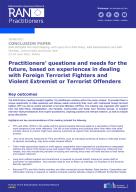Details
- Publication date
- 17 August 2021
- Author
- Directorate-General for Migration and Home Affairs
- RAN Publications Topic
- Foreign Terrorist Fighters and their families
Description
The RAN Prisons meeting brought together 22 practitioners working within the prison context. It provided them a unique opportunity to table questions and discuss needs concerning their work with imprisoned foreign terrorist fighters (FTF) as well as violent extremist or terrorist offenders (VETOs).
The meeting was organised with support from the RAN Police, Rehabilitation, and Families, Communities and Social Care Working Groups. It included interview-style presentations from expert-practitioners, inspiring practices and relevant research, as well as multiple group discussions.
Highlights and key recommendations of the meeting included the following:
- FTFs and other VETOs in the media and the general societal discourse leads to a perception of them being more dangerous than other offenders. The risk is that isolating and excluding them from offers that other inmates receive in prisons might have adverse outcomes as regards their deradicalisation and rehabilitation process.
- Very strict security measures for FTFs and VETOs, such as individual screening of books or restricted access to spiritual counselling, may have similar adverse effects.
- Tailor-made approaches based on multi-agency cooperation were requested by practitioners to adequately address the needs of the target group and support their rehabilitation from the beginning. Following their release, this may include the provision of housing and working since many will have lost ties to their family and support networks.
- Long-term political support and commitment is required to provide holistic training for prison staff on prevention of radicalisation. This includes initial as well as follow-up trainings, for example on the Dynamic Security approach.
- Returned FTFs and their family members are often connected across Member State borders. Cooperation and information sharing is required on matters of shared custody between citizens of different EU Member States.
- Addressing the potential risk of false compliance, practitioners explained that a good relation to a FTF or VETO as well as the group of inmates they are in contact with is key to conducting a realistic assessment of changes in attitude. Nevertheless, deradicalisation should not be perceived as a process with a defined ending, but as a process that continues indefinitely.
This paper summarises the outcomes of the meeting. Firstly, the paper will dive into the highlights of the discussion and explore the challenges regarding FTFs as well as other VETOs. Next, it will highlight the main recommendations formulated by practitioners.

